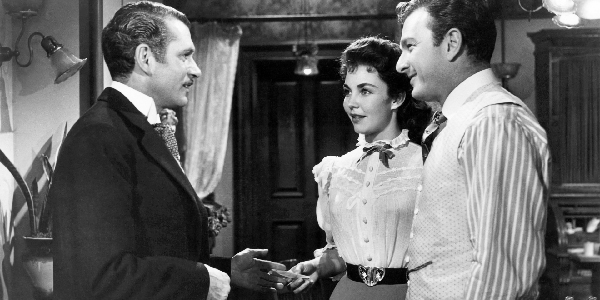
Carrie
Dir/Prod: William Wyler
Scrs: Ruth Goetz, Augustus Goetz
Pho: Victor Milner, A.S.C
Edi: Robert Swink
Prod Co: Paramount
Cast: Laurence Olivier, Jennifer Jones, Miriam Hopkins, Eddie Albert
1952 | B&W | 35mm | English | Chi subtitles | 118min
Image courtesy of Park Circus/ Paramount
Scrs: Ruth Goetz, Augustus Goetz
Pho: Victor Milner, A.S.C
Edi: Robert Swink
Prod Co: Paramount
Cast: Laurence Olivier, Jennifer Jones, Miriam Hopkins, Eddie Albert
1952 | B&W | 35mm | English | Chi subtitles | 118min
Image courtesy of Park Circus/ Paramount
When it was published in 1900, Sister Carrie attracted controversy for the perceived immorality of its characters. Afraid of being attacked as immoral in the post-McCarthy era, the studio behind the 1952 film adaptation cleaned up the story considerably, taking away the heroine's thirst for vanity and turning her into a tragic character caught in circumstances out of her control. The end of the film, which sees Carrie becoming a star stage actress, almost seems like good karma for all the misfortunes she has encountered.
Director Lee Tit and writer Ko Wong may have had Carrie in mind when they came up with Eternal Love, but the two shifted their story's focus to a man caught between traditional Chinese family values and Western individualism. Here, the hero is forced to marry a hotel owner's daughter in order to pay off his father's debts and ends up losing everything when he takes one wrong step. Using the basic structure of the American film version, Eternal Love depicts one honourable man's fall from grace as well as the bitterness and cowardice of an intellectual. Ng Cho-fan effectively conveys the psychological complexity of the tragic hero, and his final scene with this version's Carrie signals a glimmer of hope in an otherwise sad story.
Director Lee Tit and writer Ko Wong may have had Carrie in mind when they came up with Eternal Love, but the two shifted their story's focus to a man caught between traditional Chinese family values and Western individualism. Here, the hero is forced to marry a hotel owner's daughter in order to pay off his father's debts and ends up losing everything when he takes one wrong step. Using the basic structure of the American film version, Eternal Love depicts one honourable man's fall from grace as well as the bitterness and cowardice of an intellectual. Ng Cho-fan effectively conveys the psychological complexity of the tragic hero, and his final scene with this version's Carrie signals a glimmer of hope in an otherwise sad story.

